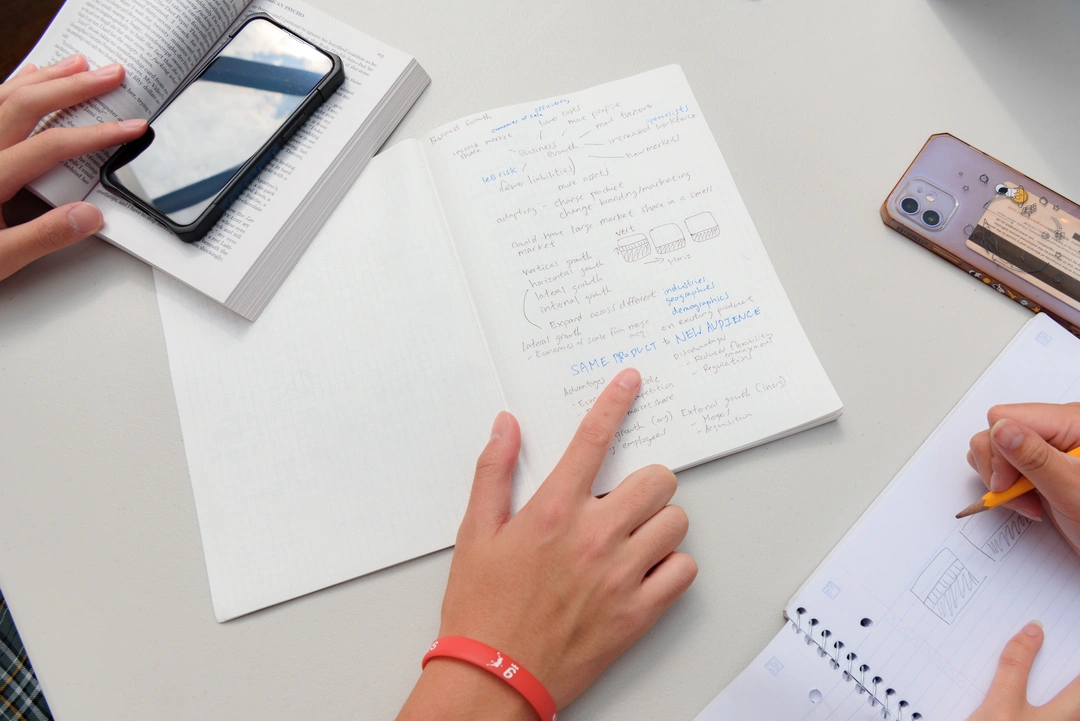Planning is a vital skill in all areas and phases of life, but especially in academia with the need to keep track of deadlines, stay organised and make time for revision.
Academic planning highlights the steps you can take to achieve your academic goals. This can involve balancing homework and deadlines with extracurricular activities, planning your revision, organising your notes and more.
Unfortunately, despite how essential academic planning is, schools often provide little support or guidance in developing strong planning skills. Therefore, this article will provide a comprehensive guide to academic planning, covering all aspects of academic life, from day-to-day organisation to extracurriculars and preparations for exam season, to help you achieve your full potential.
I. Organising Your Notes and Classwork
With so much going on in school, it can be quite difficult to keep track of all your notes and classwork, especially when studying multiple subjects. There’s nothing worse than realising you’ve lost all your class notes as exam season approaches, so here are some tips on keeping your work organised.
Note-taking strategies
First of all, it’s important to make sure the notes you’re taking in class are organised and comprehensive. This way, when it comes to revising, you’ll be confident that you have all the important details on hand.
Everyone has different preferences for structuring notes. Some students use symbols and abbreviations to make the process more efficient, while others prefer to highlight key concepts to ensure they stand out.
There are plenty of evidence-supported note-taking strategies you could try if you’ve yet to find one that works well for you. A personal favourite is the Cornell method, which separates your page to include:
- Full detailed notes
- Cue words to recall different key concepts
- A short summary of the notes
This incorporates a range of evidence-based revision strategies such as active recall (e.g. testing your recall of concepts using just the cue words), and ensures you’re actively processing your notes by writing a summary in your own words.
It’s also an excellent way to help you process what is being taught in class. Rephrasing content in your own words, rather than copying it down word-for-word, is a tried-and-tested strategy supported by science (Mueller et al., 2014).
If you prefer to take notes digitally, there are plenty of digital tools and apps for organising and syncing your notes across devices, ensuring they’re always backed up and easily accessible from different devices. For example, OneNote is great for organising your notes into different ‘notebooks’, and can be accessed on any device by logging into your account.
If you’re a fan of traditional note-taking with pen and paper, there are also tools offering a similar service using photos of your notes.

Managing class materials
Keeping track of class handouts, textbooks and reference materials is an important part of academic planning and organisation. One way to make this easier is to create subject-specific folders or binders for storing class materials. This ensures all your materials can be easily filed into the correct folder at the end of each lesson – and then easily found again during exam season. However, this can sometimes mean carrying around lots of different folders throughout the day.
A strategy that worked for me was having an expanding file folder with a section for each subject, and filing the contents of each section into the relevant binder (kept at home) at the end of the day. This means you’re only carrying around one day’s worth of work each day, while still keeping everything organised.
While it’s important to keep track of class materials, it’s also important to maintain a clutter-free and organised study environment, so ensure these materials are either filed away neatly, or decluttered if not useful. Ensuring your study environment remains organised helps to minimise distractions and enhance focus, making study sessions even more productive.
II. Managing Your Homework and Keeping to Deadlines
Homework and deadlines are the hallmark of academia, which makes managing them an incredibly important aspect of good academic planning. Keeping to deadlines is also important beyond academics, so knowing how to manage your time is a skill that will benefit you long after you leave school.
Establishing a homework routine
Dedicating some time to homework and assignments each day can help you avoid late-night cramming sessions the day before a deadline. With a consistent routine, you can also build time in after school to wind down and relax, which is vital to staying motivated and productive.
It’s likely you’ll have multiple things to get done or to work on each day, which makes prioritising another important part of academic planning. This could be based on deadlines, complexity or importance.
If you find it difficult to identify where you should spend your time, try using a traffic light system to organise your tasks. Before you start studying, allocate each task into one of three levels of priority:
- Green (low priority)
- Amber (medium, or normal, priority)
- Red (high priority)
Use this to plan your study time each day. Try to make sure you’re spreading your tasks throughout the different levels, instead of marking the majority as “high priority”.
If you have larger assignments to complete, it can be helpful to break these down into smaller, more manageable chunks, and set interim deadlines for progress tracking. This can make the task seem more approachable, and help you to consistently work on the project over the allotted time.
Using planners and calendars
There are a wide range of different planners and digital calendars available, some of which have been specifically designed for student planning. Using a planner or calendar can help you keep track of homework assignments, project deadlines and extracurricular activities, and ensure you know your daily responsibilities.
Taking some time to create monthly or weekly schedules can help you visualise upcoming tasks and allocate your time effectively. Importantly, once it’s written down in a planner, you’re much less likely to forget about it!
If you’re using a digital planner or calendar, it can be helpful to set reminders and alerts to stay on track and avoid missing deadlines. For example, you could set reminders for the day before a big deadline, or an hour before a class or extracurricular activity starts.
III. Balancing Your Extracurricular Activities and Other Commitments
While academic work is important, student planning isn’t limited to academics, and it’s vital to ensure you’re also balancing your extracurricular activities and other commitments.
Prioritising extracurriculars
Sometimes it might not be possible to continue with all your extracurricular activities as your academic workload increases, so it can be helpful to reflect and evaluate which ones you find most enjoyable or rewarding. Consider your personal interests, goals and time constraints. This doesn’t necessarily mean you have to drop a particular activity in its entirety, but it can be reassuring to know you can miss a training session or society meeting if you’re having an especially busy week.
While extracurriculars are important, knowing when to set boundaries and say no is just as important to ensure you’re not over-extending yourself. It can be helpful to express a boundary early on, such as being open with organisers or teammates about your academic workload and expressing your priorities.
On the other hand, it’s important to also not continuously sacrifice extracurriculars in the name of academics, as this can lead to a work-life imbalance and, ultimately, burnout. Having some non-negotiable extracurricular events you always attend can help to keep a healthy balance between academic work and extracurricular commitments.
It’s also worth considering extracurriculars that run outside of school term-time, or run for a set amount of time. Our Oxford summer courses allow you to explore a topic of interest in more depth, and won’t interfere with your term-time commitments!
Time management for extracurricular activities
Time management is a key academic planning skill, and is vital in ensuring you’re able to successfully balance academic and extracurricular activities. For example, if you know you have an extracurricular to attend on a particular day, then try to complete any urgent or pressing homework beforehand.
Most importantly, planning doesn’t mean that everything will always work out the way you’d hoped, so it’s vital to stay adaptable. For example, if you’ve been unable to complete an academic task in the time you’d originally planned, then you might need to carve out time elsewhere before the deadline, either by missing an extracurricular, or shortening the time spent on another commitment.
On the other hand, if there’s a last-minute extracurricular you’d like to attend, consider if it’ll have an impact on your academic work if you do attend. If so, could you skip a less-prioritised extracurricular to make time.
IV. Making Time for Exam Study and Revision
Making time to focus on exam study and revision can be quite difficult, especially if you’re still juggling existing commitments alongside revision.
Planning exam study sessions
Starting exam preparation as early as possible, and creating a structured study plan leading up to exam season, is key in planning for success.
Take the time to create a study plan so you can allocate sufficient time to revision. This will also help you identify exactly what needs to be covered, and by when. As it gets closer to exam time, it can be easy to get overwhelmed, so breaking down your subjects into individual topics and tasks can help make the whole experience less stressful.
It can be quite difficult to stick to a revision timetable, especially if it feels like you have a wealth of time before exams actually start. You could try setting specific study goals for different time points, paired with rewards when you achieve them, to help keep you motivated.
Taking the time to keep your study space free from distractions and interruptions will also help keep your study sessions focused, productive and motivating. Try putting your phone away in a drawer or in a separate room to avoid getting distracted by notifications. Keeping your desk as clear as possible is also helpful. Working in clutter means you’ll inevitably get distracted by something, be it magazines, newspapers, or anything else.

Effective revision techniques
After you’ve planned your exam study sessions, it’s vital to make the best use of your time by revising effectively and consistently. Revision works differently for everyone, and it can take some time to find the strategies that work best for you. Luckily, there are a range of approaches tested and supported by scientific evidence, such as active recall, spaced repetition and interleaved practice.
Active recall involves actively testing yourself on learnt content, rather than passively reading notes, allowing you to practise recalling information, just as you would need to in an exam.
Spaced repetition and interleaved practice both ensure that the information you’re reviewing becomes adequately integrated into your memory, so it can be accessed again when needed. Notably, this requires an early start to revision, so be sure to plan ahead!
Practising past exam papers and solving sample questions can be especially effective in revision, allowing you to test yourself and reflect on how well-prepared you are for an exam. This can help to highlight topics you may need to allocate extra time to.
Seeking clarification on these challenging topics can also make a huge difference. This could be from classmates or teachers. Remember it’s unlikely you’re the only one struggling with a certain topic.
Finally, it’s important to maintain a positive mindset during revision periods and take the time to manage any stress. Learning to foster a positive attitude in high school will not only have academic benefits, but will also improve your well-being. Taking time to consider self-care practices and stress-reduction techniques, and incorporating these into your schedule, can help to reduce burnout during exam season. Remember that at the end of the day, your well-being is the most important thing for academic success and personal happiness.
Academic planning can have powerful effects on student success. Proactively planning your time, and developing strong time-management skills, will set you up for success in school and beyond, helping you achieve your short- and long-term goals!

By Kylie Li






